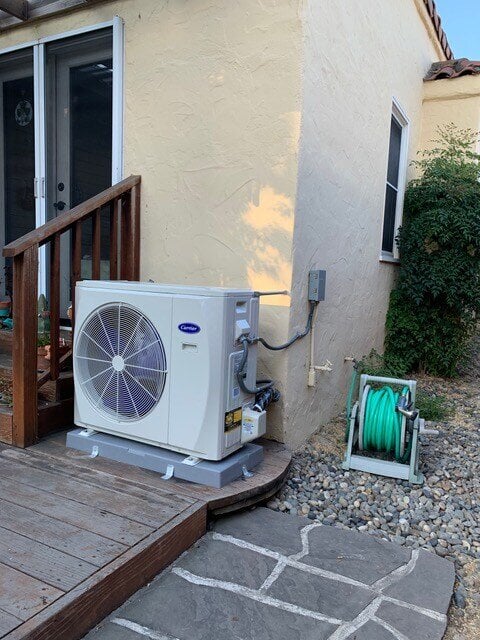How to Maximize Heat Pump Tax Credits in 2024
Updated October 31, 2024
If you're looking to make home energy upgrades like heat pumps, now is a great time.
In August 2022, the Biden administration and Congress passed the Inflation Reduction Act, which contains tax credits, rebates, and other incentives for heat pumps, water heaters, and other home upgrades.
Some of these credits are available now, and larger rebates are coming online in late 2024 or early 2025.
This article explains the various tax credits you can get for heat pumps.

- A Guide to Heat Pump Tax Credits
- What Is the High-Efficiency Electric Home Rebate Act (HEEHRA)?
- What Heat Pumps Are Eligible for Incentives?
- How Else Can I Save on Heat Pump Upgrades?
A Guide to Heat Pump Tax Credits
Starting in 2023, you are eligible for an annual tax credit of $2,000 for qualifying heat pumps and heat pump water heaters under the new tax guidelines included in the Inflation Reduction Act.
Here's a quick guide on this tax credit:
- HVAC heat pump tax credit: 30% of your project costs, up to $2,000 per year
- Heat pump water heater tax credit: 30% of your project costs, up to $2,000 per year
- Note that you can only use this credit once per year, so if you're doing both an HVAC project and a water heater, we recommend spacing them out over two years so you can claim the credit twice.
What Is the High-Efficiency Electric Home Rebate Act (HEEHRA)?
The High-Efficiency Electric Home Rebate Act (HEEHRA) program is part of the Inflation Reduction Act. The rebates in this program are based on your household income.
Designed for low-to-moderate-income households, the HEEHRA program can get you larger rebates on top of the regular tax credit. These discounts are all upfront and cover costs at point-of-sale.
As of October 2024, the program has not been fully rolled out by the federal government.
Eligibility will be tied to percentages of your local median income.
Here are the expected HEEHRA rebates for HVAC heat pumps:
- Moderate-income families who make between 80-150% of the local median income are eligible for a $4,000 rebate.
- Families who make less than 80% of the median income are eligible for an $8,000 rebate.
The HEEHRA program will eventually offer rebates for heat pumps, electric panel upgrades, and electric wiring upgrades for low- to moderate-income households.
QuitCarbon can help you make the most cost-effective decisions with our free expert guidance and introductions to vetted local contractors. Click here to get started.
What Heat Pumps Are Eligible For Rebates?
While the federal income tax credit for heat pump HVAC and water heater upgrades has increased starting in 2023, to be eligible for the credit, you must install a qualifying heat pump.
As an easy rule, any ENERGY STAR ducted heat pump is eligible for the tax credit. You can find a list of ducted and mini-split heat pumps that meet requirements on the ENERGY STAR website.
Your contractor will generally be able to advise on the best equipment options that work for your home and qualify for these rebates.
The official standards for heat pumps (water heaters don't apply here) are determined by the Consortium for Energy Efficiency (CEE). Each year, the CEE announces its updated appliance efficiency rating, formally known as the CEE tiers, which determines which heat pump HVAC systems qualify for the new federal tax credits starting in 2023. The full list of systems is available at the CEE website. The CEE tier list ranks products based on how efficient they are. To qualify for a heat pump tax credit for a heat pump HVAC system, you need to purchase and install either a ducted heat pump that meets CEE's Tier 1 requirements for your state and region, or a ductless heat pump that meets CEE's Tier 2 requirements for your state and region.
How Else Can I Save on Heat Pump Upgrades?
If you're looking to save money on heat pump upgrades, there are multiple ways to do so, even if you don't qualify for the HEEHRA program rebates. Aside from federal and state home electrification incentives, utility rebate options and manufacturer rebates are often available for heat pump appliances.
Moreover, new federal laws offer financial incentives for insulation, air sealing, and weatherization upgrades, which can enhance the efficiency of your heat pump upgrade, improve your home's comfort, and prolong its lifespan. Because 51% of your home's energy usage goes to heating and cooling alone, according to the EIA, heat pumps are key to cutting energy waste.
When applying for heat pump tax credits or rebates, be sure to consult a tax professional and ensure you have a tax liability to reduce. All tax credits are a dollar-for-dollar reduction of your income tax each year, including tax credits for rooftop solar and electric vehicle upgrades. You need to report your heat pump home energy upgrades at the end of the tax year and provide documentation to prove your purchase.




